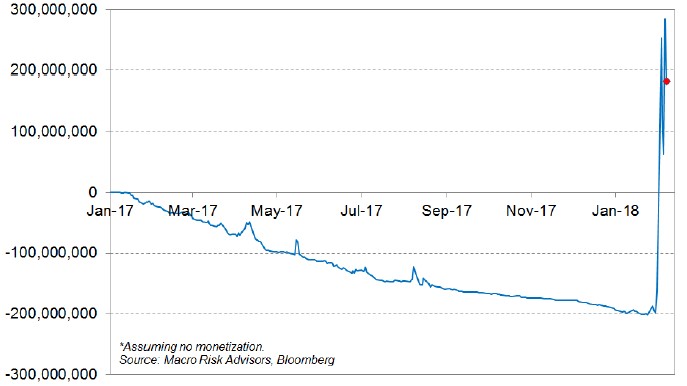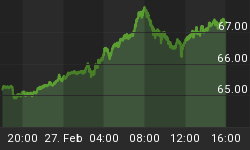Most people do not have fond memories of market crashes. After all, they are called crashes because most people find themselves on their wrong side and end up losing tons of cash. The February market selloff wiped off more than $3 trillion from stocks, making the more famous Black Monday's $500 billion loss seem tame by comparison.
For the few people who resist herd behavior and bet against the crowds though, the rewards can be huge. That's especially true in this modern era of arcane trading instruments from Wall Street.
At least two traders made hundreds of millions of dollars during that market crash.
Goldman Sachs’ Golden Payday
The CBOE Market Volatility Index (VIX), aka Fear Gauge, is a commonly used indicator that's used to gauge market expectations of near-term volatility. VIX tends to move contrary to equity indexes, falling when stocks rise and rising when stocks fall.
The CBOE Market Volatility Index (VIX) Year-to-Date Change

(Click to enlarge)
Source: CNN Money
After a long and protracted period of market placidity, VIX suddenly shot up 115.6 percent on Feb 5 to 37.32, the biggest one-day gain in the indicator's history.
Most hedge funds were at the time betting for a smooth ride in the markets to continue. Many traders had followed suit and crowded into instruments that allowed them to bet that volatility would remain subdued.
One such instrument is the VelocityShares Daily Inverse Short-Term exchange-traded note (XIV), an exchange-traded security that's supposed to give the opposite return of VIX. XIV declined more than 80 percent in extended trading after having been down only 14 percent during regular trading.
Goldman Sachs happened to be one of the few traders that wound up on the right side of VIX wagers and booked a cool $200 million on the day.
Big trading houses engage in market making in a bid to provide liquidity for their clients. Banks like Goldman Sachs make a distinction between making a market and trading an asset on a proprietary basis (which is prohibited under the Volcker rule).
Fiddy's Rags-To-Riches Story
Macro Risk Advisors has reported that there was a mysterious trader by the name “50 Cent” who was able to turn a massive loss into big profits when volatility spiked. Market participants had nicknamed the trader "50 Cent" due to his or her penchant for paying a fixed 50 cents on 50,000 VIX contract call options. Related: World's Top Diamond Jeweler Joins De Beers' Tracking Initiative
“50 Cent” persisted in his or her purchase of VIX call options in 2017 when the markets were calm, losing a bundle in the process with a good chunk permanently lost in expired option premium. Then he or she suddenly hit the pay load when market volatility spiked and helped turn deep losses into big profits to the tune of around $200 million.

(Click to enlarge)
Source: CNBC
Volatility Products Banned
A careful analysis of the February selloff revealed that certain traders had shorted XIV in large volumes, forcing Credit Suisse (the issuer) to purchase huge amounts of futures contracts in a bid to balance out the trade. Credit Suisse appears to have been blindsided by the turn of events and subsequently withdrew XIV from the market.
XIV belonged to a relatively new class of 'short-vol' products that traders have been using to bet against market volatility. But the events of Feb 5 clearly demonstrated how risky these exotic instruments can be.
With BlackRock Inc., the world’s biggest ETF provider, pushing for greater regulation of volatility products, it might be hard for the likes of Goldman and 50 Cent to make those kinds of absurd profits in such a short time in the future.
By Alex Kimani for Safehaven.com
More Top Reads From Safehaven.com:
















